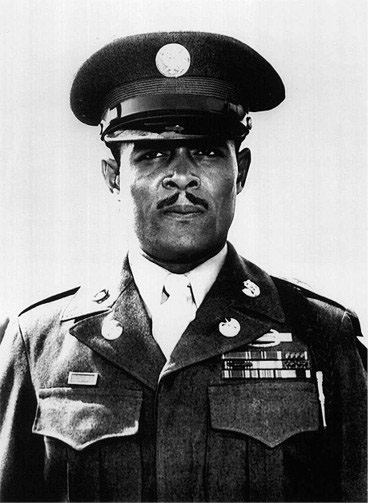
At the end of the American Civil War, 21 African American soldiers had been awarded the Congressional Medal of Honor. American soldiers with dark skin earned Medals of Honor in every subsequent war until, strangely, World War II.
As a child, Edward Carter Jr, an African American, lived in Shanghai, China with his missionary parents. At 15, he joined the Chinese Army and rose to the rank of lieutenant before it was discovered that he was a child. Discharged, he enrolled in a Shanghai military school where he received extensive military training and learned four languages, including Mandarin Chinese, Hindi and German.
During the Spanish Civil War, Carter joined the Abraham Lincoln Brigade, a volunteer unit fighting General Franco’s fascist regime and his NAZI allies. After that he insisted in the U.S. Army, just months before the Japanese attack on Perl Harbor. Some time in 1942, a counterintelligence service put him on a watch lists because of his service in Spain. The Lincoln Brigade’s administration had socialist leanings – and he spoke Chinese. In 1944, he was shipped to Europe but delegated to supply duties, in-spite of his military experience. Later that year, General Eisenhower, running short of combat soldiers, instituted the volunteer Ground Force Replacement Command. Early in 1945, 4,562 darker skinned soldiers, were serving in previously all white units, including Staff Sargent Edward Carter. He came to the attention of General George Patton who selected him to serve as one of the general’s guards.
Later Carter relinquished his rank so that he could enter combat duty as part of the general’s “Mystery Division” and he was recommended for the Medal of Honor by his superiors. Instead the Army gave him the second highest honor, The Distinguished Service Cross. After recovering from wounds and being re-promoted to Staff Sargent, Carter finished the war training troops. By that time, Staff Sargent Edward Carter had received the Distinguished Service Cross, Bronze Star, Purple Heart, American Defense Service Medal, Combat Infantry Badge and numerous other citations and honors.
When he tried to re-enlist, the Army barred his enlistment without explanation. Carter died of Lung Cancer in 1963, a result of shrapnel that was still in his neck.
In 1997, Sergeant Carters body was exhumed and taken to Washington where he was moved in a horse drawn caisson and full military honors to a finally resting place in Arlington National Cemetery and President Clinton posthumously award the Congressional Medal of Honor to Carter’s son, Edward Allen Carter III.
Source: Military Museum – https://goo.gl/dQmefP

A story that might enliven discussions of world history prior to World War II, or race relations in America . . . and probably left out of every curriculum specified by the states, or even created by individual teachers.
Is he even honored as part of Black History Month?
Thanks for the story, and the reminder that a lot of the best history is just left out and forgotten. But shouldn’t be.